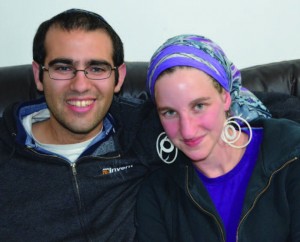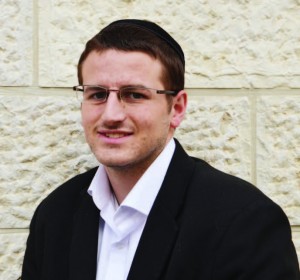The NBN Generation: Twenty-Somethings on Making a New Life in Israel
By Zvi Volk
Like many of his friends, Max Rabin learned in a yeshivah in Israel the year after he graduated high school. That’s where his path diverged from most of his friends. Instead of returning to his hometown of Los Angeles, he stayed in Israel. He spent two years in yeshivah, then joined the IDF and finally spent four years at Machon Lev in Jerusalem where he received his BA in software engineering.
It was in his final year at Machon Lev that he met his wife, Tammi, twenty-six.
Today the Rabins have a two-year-old daughter and live in a rented apartment not far from Emek Refaim Street in Jerusalem’s German Colony, which is the heart of the action for many religious English speakers—especially twenty-somethings.

Tammi and Max Rabin met in Israel. Today they have a two–year-old daughter and live not far from Emek Refaim Street in Jerusalem’s German Colony.
“Sometime during my first year in Israel, I realized I wanted to make my life here,” Max says. “Once I finished the army it made sense to go to university here. And that helped me improve my Hebrew and develop a broader group of friends.”
Max is a computer programmer who is working for his second start-up. Because he had connections and there is a demand for software engineers, he didn’t have difficulty finding a job. Both companies were started by English speakers. “But I’ve been here long enough that my Hebrew is fluent,” he says.
The Rabins are still trying to figure out where they want to live in the future.
Why Leave Jerusalem?
What would make them want to leave Jerusalem? The housing prices and the fact that Jerusalem is becoming so crowded.
“The yishuv [small community] way of life appeals to us,” Tammi says. “We would like to live in a place where we don’t have to worry where our children are all the time. I also want our kids to grow up knowing that there are people in the world who aren’t frum,” she says. “We want a place that’s accepting, more diverse. The problem is, the type of yishuv we would like probably doesn’t exist.”
Yehoshuah Levin: Home at Last
Yehoshuah Levin, twenty-two, originally from Denver, came to Israel to attend yeshivah after high school—and stayed. He’s now studying industrial engineering at Machon Lev in Jerusalem.
“There’s no other place in the world where I can walk the same land as my forefathers,” says Levin.

Yehoshuah Levin, twenty-two, came to Israel to attend yeshivah after high school—and stayed. He’s now studying industrial engineering at Machon Lev in Jerusalem and plans to join the IDF when he graduates. Photos: Zvi Volk
During his first year at Machon Lev, Levin was in the English program. He studied business and marketing for a year before switching to industrial engineering, which is taught in Hebrew.
For Levin, learning in Hebrew was not a great hardship. “My Hebrew is at a very high level,” he says. “Now that I’m in the Israeli program, my lectures are in Hebrew, as is a lot of the reading. Israelis often ask me to translate from English to Hebrew for them.
“One of the nice things about Machon Lev is that a lot of Americans teach here,” Levin adds. “So if I need to I can speak English. At the same time, I’m becoming a part of Israeli society.”
Once he graduates, Levin plans to enter the IDF. “A lot of companies want to know what you did in the army,” he says. “So I expect it will be easier to find work once I’ve finished my army service.”
Levin, who was active in NCSY, describes himself as “black hat but slightly modern.”
Levin finds that people in Israel “go out of their way to help one another.” Levin does his own share of chesed. He works with a child who has Leigh syndrome, a rare disorder that affects the central nervous system. Last year, he and a friend pushed the child for six miles in the Jerusalem Marathon. He also volunteers with Yachad Israel, the OU-sponsored organization dedicated to addressing the needs of Jewish individuals with disabilities.
Would he consider marrying a non-native English speaker? “Yes,” he says, “but I think I would prefer a native English speaker. Not because of any language barrier, but there are still cultural differences.”
Zvi Volk is a staff writer in the OU Communications and Marketing Department. He has lived in Jerusalem since the mid-1970s.
